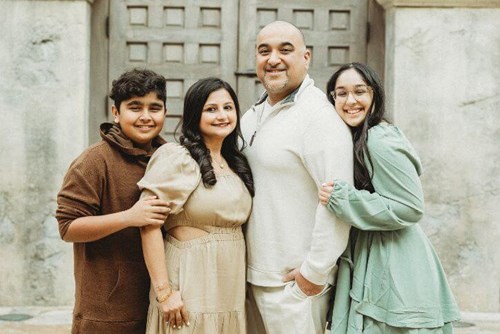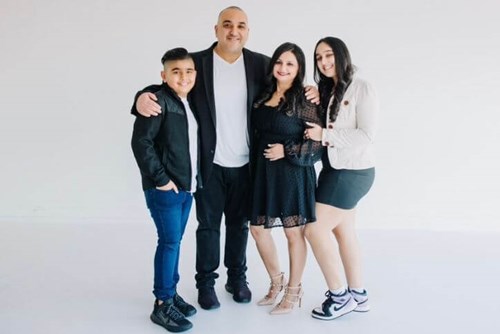
10 November . 2024
Meet The Grove Frisco resident Sadaf Moosa, breast cancer survivor turned advocate for early detection
When she was about to turn 40, Sadaf Moosa got a call that completely changed her life: her doctor’s office was phoning to tell her she had been diagnosed with breast cancer. Today, five years later, Sadaf is a breast cancer survivor who advocates for awareness and early detection.
In honor of National Breast Cancer Awareness Month in October, this courageous resident sat down to share her story with us.
Let’s start with an easy question. How long have you lived at The Grove Frisco, and what do you enjoy the most about living here?

I have lived in The Grove Frisco with my husband, Riz, and my kids Raina & Aryan-Sahir, for about three years, and it truly feels like home. The people here are wonderful, and the schools have been exceptional. Each zoned school has exceeded our expectations.
The Grove Frisco is such a beautiful and welcoming community, and our neighbors are truly a blessing. We feel safe here and love being part of this close-knit community.
The HOA-hosted events are fantastic; they’re always so much fun, thoughtfully organized, and provide a great way to connect with everyone. The staff is incredibly helpful and dedicated, making life here even better. Friends and family who visit us always comment on how amazing this community is, and we couldn’t agree more.
Please tell us about your journey with breast cancer, from diagnosis to remission.
Five years ago, when I was about to turn 40, I got a call that completely changed my life. My doctor’s office informed me that I had been diagnosed with breast cancer.
At that moment, I was overwhelmed with fear. My thoughts raced, my heart pounded, and I couldn’t stop the tears. What would this mean for my kids? My husband? Shadows of worst-case scenarios clouded my mind. When I finally regained my composure, I made a promise to myself: I will be strong. I will fight with everything I have, stay positive, and ensure my kids feel secure and loved no matter what.
So, how did I find out? Honestly, I was fortunate. As I approached 40, my family and friends kept encouraging me to get a mammogram. It was for no particular reason, just due to my age. I brushed it off for months, thinking I was healthy and far too busy.
But one day, as I was scheduling my physical online, a prompt suggested making an appointment for a mammogram. Coincidentally, the imaging center was right across from where I’d have my physical. I thought, “If the timing works out, I’ll go ahead with the mammogram.” The schedules aligned, so I made the appointment.
I never expected the diagnosis that followed. In that moment, I felt in my heart that God had guided me to that test, watching over me in a way I hadn’t even realized.
In fact, I’d actually gone in for a mammogram at 39, and the office cleared me for two years, saying I was too young and would be fine until I was 41. Looking back, I am beyond grateful that I was encouraged to follow up and go back for that checkup. It was truly a blessing.
What was the most difficult part of your treatment journey, and how did you overcome it?
It was facing the unknown and managing the physical and emotional toll of each step. From the shock of diagnosis to enduring multiple surgeries and the intense side effects of treatment, there were moments when fear and exhaustion felt overwhelming.
Balancing my role as a mother of two young children and wife while trying to stay strong for my family was incredibly challenging. But I overcame this difficult period by focusing on small, manageable goals, leaning on the love and support of my family and friends, and reminding myself that each day of treatment was a step closer to recovery.
My faith also played a powerful role, giving me the courage to face each new challenge and the resilience to keep going. Looking back, it was my loved ones, my inner determination, and the belief in God in a healthier future that helped me push through, even on the hardest days.
We understand that you are now in remission?
Yes, and I feel an immense sense of relief and gratitude. But my journey isn’t quite over. To help prevent the cancer from returning, I’m currently on a regimen of low-dose chemotherapy pills.
These pills are designed to target any lingering cells and reduce the risk of recurrence, providing an extra layer of security in my recovery. While taking these pills has its own set of side effects, I view them as part of the path to long-term health and healing.
This stage requires patience and persistence, but with each dose, I feel like I’m actively contributing to my own future, strengthening my resolve to stay cancer-free.
How has your life changed, and what have you learned?

My life has changed in profound ways since my breast cancer journey. I’ve come to appreciate each day more deeply, recognizing the fragility of life and the strength within me.
I’ve learned to prioritize my health and well-being, setting aside the busyness of life to care for myself and cherish my loved ones.
This experience has taught me resilience, patience, and the importance of a strong support system. I now understand the value of early detection and feel a deep responsibility to encourage others to stay proactive with their health.
My outlook on life is more grateful and grounded, and I find purpose in spreading awareness, knowing that my story might inspire or help others along the way.
My request to every incredible, resilient woman: please get your mammogram. Spread the word. Let’s create awareness and fight together—because even one life lost is one too many.
As a survivor, what does National Breast Cancer Awareness Month mean to you?
I find myself reflecting on what it means to me as a survivor. This month is a reminder of the journey I’ve been through and a celebration of strength, resilience, and hope. It’s a time to honor those who’ve battled breast cancer, acknowledge those still fighting, and remember those we’ve lost.
For me, it’s also a call to action—to raise awareness, advocate for early detection, and encourage others to prioritize their health. Knowing that 1 in 8 women will face this disease in their lifetime makes it crucial that we spread knowledge and support each other. This month fuels my commitment to share my story, to show others that they’re not alone, and to inspire everyone to take those life-saving steps.

